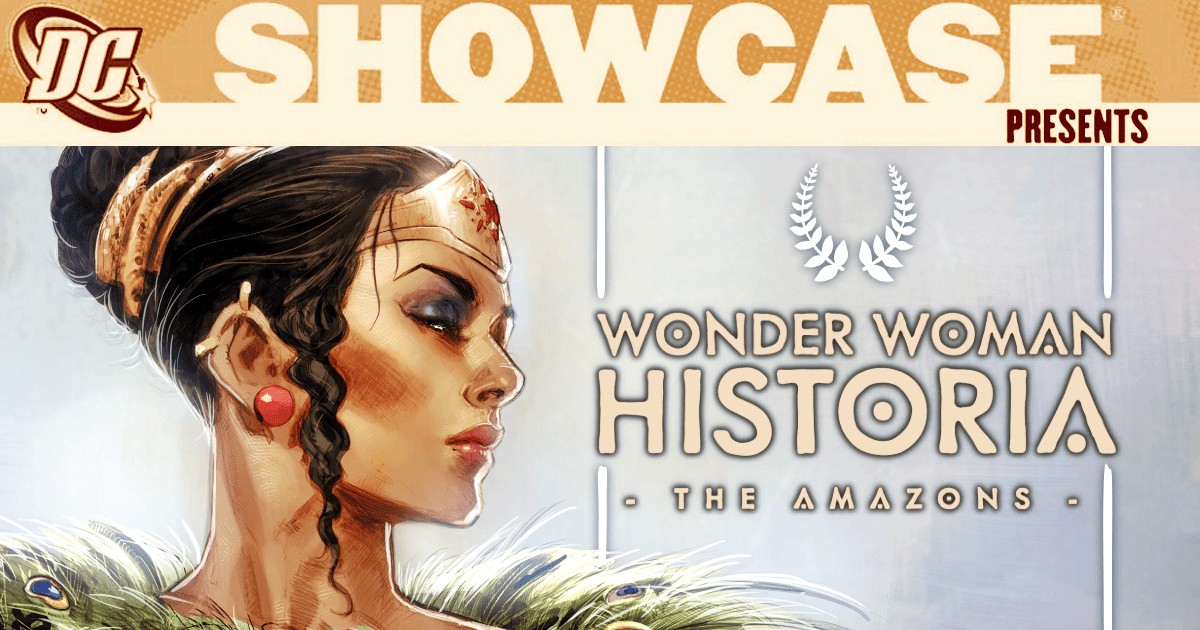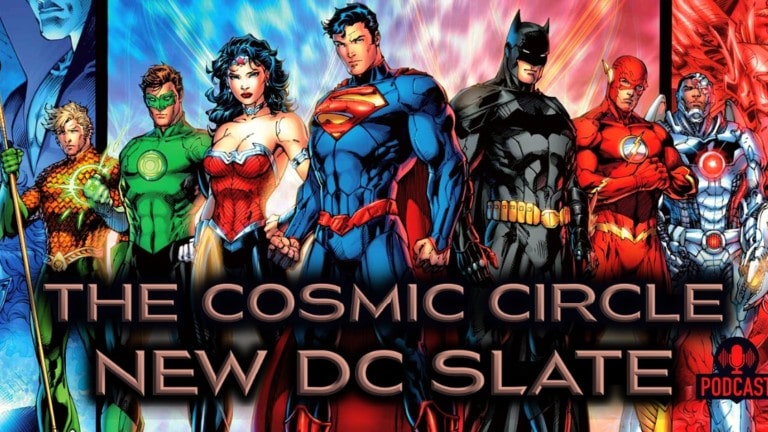DC Showcase: ‘Wonder Woman Historia: The Amazons’ Comic Review

Wonder Woman Historia: The Amazons is a brand new retelling of the origin of Wonder Woman. This might seem like a well-known story to most Wonder Woman fans, but this is an all-new version of history, brought to life in a visually-arresting way that no medium has ever done before.
Historia was one of the first comics announced for DC Black Label in 2018. Black Label is a new imprint for mature, prestige comics that use elements from classic stories, but like Earth One, are safely out of continuity. This allows the creators full freedom to reinvent their characters and mythologies with almost no restraints.
Since the Black Label announcement, the first issue of Wonder Woman Historia took over three years to come out due to the depth and breadth of the project. Each issue is an oversized 64 pages, written by Kelly Sue DeConnick, and drawn by a master artist with an intricate level of detail. Phil Jimenez, Gene Ha, and Nicola Scott do the art for the first arc, issues #1-3.
The completed first arc has already cemented Historia as one of the greatest achievements in the Wonder Woman pantheon, and possibly the most distinguished version of the Amazons’ story. The creatives’ work was instantly recognized for its outstanding contributions to the comics medium: In 2022, Historia #1 won two Eisner Awards, for Best Single Issue (DeConnick & Jimenez) and Best Penciller (Jimenez). DeConnick has plans for two more arcs that will culminate with the arrival of Steve Trevor on Paradise Island.
When talking about the upcoming DC Studios series Paradise Lost, James Gunn briefly described the project as a Wonder Woman prequel about the Amazons and compared it to Game of Thrones. Given the high acclaim Historia is earning, let’s take a look at Wonder Woman Historia: The Amazons and see how it could influence the new live-action TV series!

The story of Wonder Woman Historia: The Amazons
Wonder Woman Historia: The Amazons tells the complete story behind the creation of Themyscira. The comic chronicles the division between the Gods and Goddesses, the inception of the Amazons, and Hippolyta’s rise as Queen. If that sounds familiar, it’s because Historia‘s plot follows many of the same beats laid out in the first issue of George Pérez’s Wonder Woman reboot in 1987.
Pérez’s reimagining is so iconic that it has influenced almost every iteration of Wonder Woman’s world for the past 35 years. However, with nine prestige-sized volumes and a modern woman’s perspective, the story style of Historia is very different from any previous versions fans have seen before.
As a big fan of George Pérez’s Wonder Woman, I was skeptical about what Historia could say that hadn’t been said already. But Historia doesn’t replace George Pérez’s work – it builds on it. DeConnick respects Pérez’s original intentions while fleshing out the details in bold, beautiful, and modern ways. Where Pérez tells the Amazons’ story in one 35-page issue, DeConnick spreads her story across nine issues of 64 pages each. That’s sixteen times longer! A single issue becomes a grand comic epic. The result is a story that gives you more.
Wonder Woman Historia uses the extra space to explore the characters: their conflicts, their majesty, their humanity, and their fallibility. The narrative spends equal time with the Goddesses and the Amazons, in order to tell the women’s story as it really happened, without the revisionist history of men.
These women are not perfect, and the extended format allows DeConnick to relish in their complex nuances. The three issues thoughtfully explore the eternal pursuit of justice as the consequences of injustice become the driving force of the story. The characters’ mistakes cause battles, disappointments, and emotional catharses that elevate the heroes of Historia while keeping them profoundly honest.

The majesty of Wonder Woman Historia
DeConnick allows her artists to shine in Historia, slowing the pace when needed to luxuriate in the splendor of the meticulously-detailed visuals. All-star artists Phil Jimenez, Gene Ha, and Nicola Scott bring the best work of their careers to Wonder Woman Historia as they reinvent the Gods, the Goddesses, and the emotions at the heart of the Amazons’ story. There has never been a DC comic with more grandeur and love visible on every page.
The first issue is drawn by Phil Jimenez with colors from Hi-Fi, Arif Prianto, and Romulo Fajardo, Jr. Their work on this issue sets the standard for the series to come. From their very first page, Historia is intoxicating. The story begins with forty pages of gigantic double spreads to represent the saga of the Gods, with intense colors that make everything on the page seem important. There’s so much rich beauty maximized in every detail that every panel becomes a visual masterpiece. It’s overwhelming. It’s too much. It’s impossible to appreciate properly all at once. But also, it’s just right.
Jimenez’s work in Historia #1 captures exactly what it would be like to behold the Gods. There’s just too much visual information for mortals to register. Reading on a phone won’t work. Reading on a tablet won’t work. The only way to truly enjoy the scope of Jimenez’s Historia is to hold the physical book before you, so you can drink in the details of each page at full size.
Despite the fact that the artwork is unbelievably beautiful, trying to process forty pages of massive, complicated spreads can feel exhausting at first. It’s too much when you’re trying to follow the story for your first read-through. But the level of detail also means that each re-read becomes richly rewarding. Jimenez’s maxed-out art makes issue #1 the most dense issue to read, but this style is exactly what makes it the most representative of the giant, bold, and unapologetic mindset that embodies Wonder Woman Historia. It needed to be like this.

Gene Ha and colorist Wesley Wong take over art duties for issue #2. Ha’s art is much softer and simpler than Jimenez’s, and he adds his own intricate details with geometric panel layouts based on the golden ratio and hidden goddesses watching the Amazons through nature. While different, the art is still magnificent.
The final issue of the arc is drawn by Nicola Scott with colors from Annette Kwok. I’ve loved Nicola Scott’s work for years, but I’ve never seen her work with this level of depth and majesty. With issue #3, DeConnick’s plotting eases into more action-heavy territory, which balances perfectly with the dramatic emotions in Scott’s artwork. The thrilling tragedy in tandem with the easy richness of the art made this my favorite issue to read and a triumphant finale.
The cinematic potential of Wonder Woman Historia
The DCU show Paradise Lost has been described as “Game of Thrones on Paradise Island,” yet the women in Historia make decisions by consensus rather than conflict. Future issues might reveal more strife; for example, Antiope’s group should eventually leave Themyscira to form the Amazons of Bana-Mighdall – but this hasn’t happened yet.
It’s difficult to compare the comic’s plot to the show’s premise since the first arc of Historia is only about the creation of Paradise Island. This is a story about female unity, where the main conflict is the Gods vs. the Goddesses & Amazons – not the Amazons fighting each other. At the very least, I’m thankful Paradise Lost is a series rather than a film, because the operatic drama of the Amazons deserves the longer television format.
I don’t think the visuals of this book could ever be adapted faithfully, given how perfectly Historia uses the comic medium. However, I think it could be the inspiration for the creatives behind Paradise Lost to develop their own visually-stunning style that is tailor-made for live-action. I would especially like to see the character designs of the Gods and Goddesses carry over.
Historia has completely redefined the Wonder Woman mythos not just for comics, but at a visual and conceptual level itself. I’m thrilled to see the impact this series will have on Wonder Woman’s future stories across mediums.
Given Kelly Sue DeConnick’s experience with TV, it would be exciting to see her involved with the show in some capacity. I hope the themes, complexities, and visual design of Wonder Woman Historia can serve as a reference for Paradise Lost in order to bring this powerful vision to life.

Is Wonder Woman Historia for new readers?
Wonder Woman Historia is the very beginning of the beginning, so no prior reading is needed. But if you’re interested, I recommended starting with Wonder Woman (1987) #1 by George Pérez and Greg Potter. This is the original version of Historia’s story, so reading this first will allow you to fully appreciate how DeConnick and her artists expanded upon Pérez’s initial introduction.
After Historia, I recommend continuing with Wonder Woman: Year One (2016) by Greg Rucka and Nicola Scott. This comic picks up with Steve Trevor landing on the island, Diana’s arrival in Man’s World, and her rise as “Wonder Woman.” With the story beats and shared artist, Year One feels like a spiritual sequel to Wonder Woman Historia.
My verdict on Wonder Woman Historia: The Amazons
The art might seem overwhelming, but do not be deterred: Wonder Woman Historia is an essential, enjoyable, and eternal masterpiece.
I love Greg Rucka’s Wonder Woman: Year One. I love George Pérez’s Wonder Woman: Gods and Mortals. But Wonder Woman Historia is something new and complementary that operates on a higher level. Historia elevates the Wonder Woman canon. The pages are saturated with the blood, sweat, and love of the artists, and the fact that it is written by a woman is felt deeply in the DNA of the book.
With Wonder Woman Historia: The Amazons, Kelly Sue DeConnick, Phil Jimenez, Gene Ha, and Nicola Scott become four of the most important architects of the Amazons’ mythos in history. This is the Wonder Woman story of the ages. What an incredible beginning.
Have you read any of the Wonder Woman comics before? Are you excited about the Paradise Lost series? Let me know on Twitter @vinwriteswords and remember to follow the site @MyCosmicCircus for more comics coverage coming soon!
Check out our full list of DC Showcases here, including our review of Green Lantern: Earth One! Also listen to our discussion about the new DCU Slate on our Cosmic Circle podcast!




